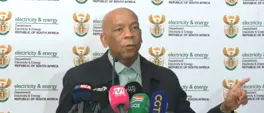MANDY WIENER: Government should not take a knife to the corruption gunfight
Mandy Wiener
21 September 2023 | 4:35The National Prosecuting Authority has suspended next year’s intake for its internship initiative, due to budget constraints.
OPINION
“This is not government’s country. It is South Africa’s country,” a rampaging BLSA CEO Busisiwe Mavuso said to rapturous applause at the SAICA Anti-Corruption conference at #Leaderex last week.
I had asked her about Business Leadership South Africa’s funding of former Eskom CEO Andre de Ruyter’s private investigation into widespread corruption at the power utility. The SIU had been before parliament and had chastised BLSA’s decision to financially back the probe.
Mavuso was vehement that if the private sector were to be asked again to do so, it would.
“Government is not going to allow the private sector to use it when it suits them. When we think we need to intervene as the private sector we are going to intervene. We don’t need their permission. This is not government’s country. It’s South Africa’s country. And if this thing falls apart, we are all going to lose,” she said.
“What the private sector in this country is never going to do in this country is give money to government because as soon as you give the money, it goes into a deep dark hole. If we want to help government, give them the resources to be able to do their job. Give them engineers to fix Eskom, and give them accountants to fix municipalities. Give them the skills that they require in order to do what they need to do.”
Mavuso’s sentiment was evidently shared by many in the private sector.
There have also been practical developments in the past few weeks by BLSA in publishing an anti-corruption working guide for the private sector. It is effectively a blueprint for corporate South Africa to adopt to fight corruption. BLSA funded the Gordon Institute of Business Science to produce the guide which looks at the findings and recommendations of the Zondo Commission.
This will ideally invigorate the private sector to fend off complex corruption such as that which took hold at Steinhoff, Tongaat Hulett and EOH.
Crucially, the business sector, through an agreement with the National Prosecuting Authority and through the National Logistics Crisis Committee and the Joint Initiative to Fight Crime and Corruption (JICC), is looking to bolster the NPA’s capacity to deal with the ‘spaghetti’ cases of complex malfeasance. We have already seen the assistance of private law firms and consultancies on specific cases in the past.
Two years since Zondo’s recommendations and there is still enormous expectation placed on the NPA. The organisation has made considerable progress in recapacitating itself since the state capture era, but expectations remain as convictions continue to elude it.
Disappointingly, the NPA announced earlier this month that it had been forced to suspend the 2024 intake for its internship initiative, the Aspirant Prosecutor Programme, due to government budget constraints.
The programme entails in-service training which assists law graduates in gaining practical prosecutorial experience. The program runs for 12 months after which competent candidates are appointed to entry-level prosecutorial positions within the NPA.
According to its annual report, the NPA appointed 250 aspirant prosecutors at its training centres in January 2022 and 298 were permanently appointed at the end of last year. There were to be 344 recruits in the next intake.
Keeping in mind of course that the NPA was a key site of state capture and was eviscerated during the Zuma era, it is essential that prosecutors are lured back to the public sector.
In a statement in June this year, the NPA sought to give an assurance that had expanded its capacity and expertise to prosecute highly complex corruption and state capture cases. It has done so by turning to some of the country’s leading Senior Counsel.
“The NPA’s expanded approach builds on previous experience and practice. It starts with strategic case coordination and prioritisation of impactful cases and extends to enlisting the services of the country’s leading Senior Counsel and other local and international experts to support prosecutors and ID investigators in their work. This expanded use of seasoned advocates and other experts to support our specialist staff, which we have now applied in some key cases already enrolled, will ensure that the NPA is able to deal with all aspects of these complex cases, in a sustainable and coordinated manner, with the best available resources,” said the NPA.
Chairperson of B4SA steering committee Martin Kingston has said that the private sector assistance for the NPA, the ID and the Hawks must be transparent to ensure there is no perception of bias. That is crucial.
But what is also clear is that we can’t take a knife to the corruption gunfight.
Government, like business, must recognize that it too must prioritize funding and support of these institutions if it is going to get the results it expects of them. This means funding of the Aspirant Prosecutor Programme should not be compromised. It is about changing the culture of South Africans and convincing young, eager lawyers to become prosecutors and grow and nurture their expertise.
Get the whole picture 💡
Take a look at the topic timeline for all related articles.
Trending News
More in Opinion

17 October 2025 12:54
MALAIKA MAHLATSI | Ntshavheni’s alarming constitutional delinquency, inhumanity and impunity

17 October 2025 12:42
CHRIS OXTOBY & JUDITH FEBRUARY | JSC interviews – Showing a challenging road ahead?

15 October 2025 14:59
CHARLES MATSEKE | South Africa’s quiet privatisation and the birth of an Oligopoly












